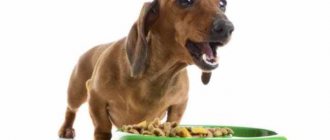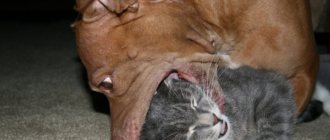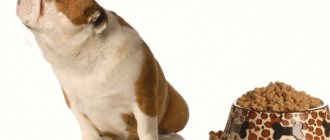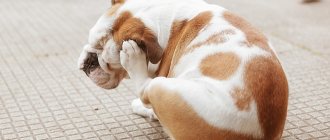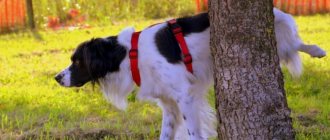For every owner, the health of their pet is a top priority. Therefore, if a dog refuses to eat, this is always a cause for concern. There is no need to panic right away, but it is recommended to pay close attention to your pet. There are many reasons for this phenomenon, so you need to carefully analyze all the symptoms and draw the right conclusions.
If your pet remains active
In this case, we can say that everything is not so bad, but you should not lose your vigilance. The fact is that the need for food is leading. Therefore, even if the animal does not feel hungry, it will not refuse food, especially treats. There must be compelling reasons for this. So let's look at why a dog refuses to eat?
- If a puppy, as it grows up, begins to refuse one of its meals, then there is nothing to worry about. It’s just that now he no longer needs additional feeding.
- If an animal plays and frolics, but often turns away from the cup, this may mean that it is simply picky and expects more tasty pieces from its owner.
- If there was serious physical activity in the evening, then do not be surprised that the dog refuses to eat in the morning.
- It is not uncommon for a female dog in heat to ignore the bowl. If you have a male living with you, and on a walk he meets a female in heat, the reaction will be similar. These are hormones and nothing more.
- The next reason could be stress. If the owner left the animal in the kennel and went on a business trip, then in almost 100% of cases the dog refuses to eat. For the first few days she won’t even drink water, but with a good attitude she will soon calm down.
The main reasons why a dog refuses to eat
There are many reasons why a pet may refuse to eat. Some of them are related to the character and lifestyle of the animal, everyday situations and climatic conditions. These factors can be easily eliminated if the owner carefully monitors the condition of his four-legged friend. It is much more difficult to cope with the situation when fasting is caused by illness. Let's take a closer look at the 13 main reasons why a dog refuses to eat:
- stress;
- change in diet;
- thermoregulation;
- sexual instinct;
- pregnancy;
- postpartum period;
- presence of parasites;
- disease of the teeth and oral cavity;
- poisoning;
- foreign body in the stomach or intestines;
- viral infections;
- kidney disease, liver disease, urolithiasis;
- reaction to anesthesia.
Stress
Among dogs there are melancholic and sanguine people, phlegmatic and choleric people. Just like people, they approach life situations differently. The cause of stress in a pet can be moving to a new home, renovations, or a temporary stay in a shelter due to the beloved owner going on vacation. Mental distress results in a refusal to eat: for some individuals it lasts 2-3 days, others react sharply to the changes that have occurred and do not look at the bowl of food for longer. During a stressful situation, it is necessary to pay more attention to the pet, distract it from external stimuli; in severe cases, veterinarians recommend taking sedatives.
Changing your diet
Nutrition is the most important tool for managing your dog's health. Four-legged pets also have their own gourmets. So, for example, if a dog is accustomed to natural food, it may turn away from dry food, and vice versa. Before experimenting with your pet, think about this . In addition, some picky canines stop eating if they believe that their food is monotonous. A properly balanced diet helps avoid the problem.
Read how to create the right balanced diet.
Thermoregulation
Most dogs, even short-haired breeds, do not tolerate heat well. Prolonged exposure to the sun leads to overheating of the animal's body. If thermoregulation is disrupted, the dog does not eat, but drinks a lot. She looks lethargic, tries to find a cool place, moves little during walks and tries to go home quickly. In such a situation, you should not insist that your pet eat all the food, small portions are enough.
Important!
During the hot season and with intense heating in winter, you should provide your dog with plenty of fluids. There should always be sufficient water in the animal's bowl.
Sexual instinct
Refusal to eat is caused by changes in hormonal levels in female dogs during estrus. Sex hormones affect the psychological state of the animal, the dog loses interest in food. The natural desire to reproduce disrupts the entire routine of life, including the pet’s reluctance to eat. The owner should not worry, because as soon as the “critical days” subside, the appetite will also be restored.
Bitches and males react to heat in the same way. If your pet gets very excited when detecting signs of a female dog in heat, he may refuse to feed. An acute reaction of the nervous system suppresses the hungry instinct. Try to protect the dog from irritating factors, change the place of walking for a while.
Read more about estrus in dogs.
Pregnancy
During pregnancy, there is a subtle restructuring of the bitch’s body, it works with increased load, and the appetite increases. However, towards the end of pregnancy, the dog may stop eating. There is nothing dangerous about this. The expectant mother is intensely busy looking for a suitable place to give birth, she gets worried and completely forgets about food. If, in addition to refusing food, your dog has other symptoms of the disorder (dry nose, chills, fever), you should contact a veterinarian.
Read the complete guide to pregnancy.
Postpartum period
After giving birth, the bitch’s body needs some time (2-3 days) to return to normal. During this period, she may not eat. The main thing is that the dog does not stop drinking. If the situation worsens, when the animal completely stops eating, looks lethargic, the nose becomes hot and dry, and she is shivering, it is better to show the pet to a doctor. The listed symptoms indicate an inflammatory process.
Parasites
Poor appetite and weight loss can be caused by external and internal parasites. Often owners, noticing that their pet is not eating well, blame worms. In order to make sure of this, the dog needs to be examined, and not thoughtlessly given anthelmintic drugs .
Attention!
Puppies infected with helminths require emergency care. Rapid weight loss and refusal to eat lead to the death of babies.
The culprit for a sharp decrease in a dog’s appetite may be a tick that has attached itself to the animal’s body during a walk in the park or through the forest. Be sure to examine your pet after such walks. If you cannot remove the parasite yourself, take your pet to the vet.
Read more articles about worms and ticks in dogs.
Oral diseases
Oral diseases have a direct effect on a dog’s lack of appetite only when they are in an advanced state. The process of chewing food in dogs is weak, so minor pain does not affect the animal’s appetite. To eliminate the cause, special dental procedures are performed. The diseased tooth is removed, ultrasonic cleaning is carried out, removing plaque.
In difficult cases, anti-inflammatory therapy is carried out with appropriate medications. Injuries to the oral cavity also require special treatment.
Poisoning
Food or chemical poisoning is a very common reason for a dog to refuse food. Stale meat and stale fish cause indigestion, the dog’s stomach growls suspiciously, low-quality products are fermenting, and the animal stops eating. When poisoned by chemicals, a dog vomits and salivates more. What should a pet owner do? These are serious symptoms that should not be ignored. The pet should be taken to a veterinary clinic, where it will receive the necessary assistance.
While walking, watch what your pet picks up from the ground. Often the cause of poisoning and death of dogs is bait scattered by dog hunters .
Foreign body or fur in the stomach and intestines
Loss of appetite may be due to foreign bodies (sausage skins, small bones, hairballs) entering the dog’s digestive system. A pet, especially at a young age, may accidentally swallow some small object at home. The foreign body provokes intestinal obstruction, the dog has a stomach ache and vomiting. In such a situation, the animal needs to have an x-ray examination of the stomach and intestines. Depending on the location and size of the foreign body, treatment tactics are developed.
Read what bones can be given to dogs.
Viral infection
During the cold season, viral infections haunt weakened, young and elderly dogs. A common cold can cause an animal to have an increase in temperature and increased discharge from the nose and eyes. Refusal to eat is added to these. The treatment method for a viral infection must be determined by a doctor. As a rule, to determine the pathogen and the presence of an inflammatory process, blood sampling is required.
Liver, kidney and urolithiasis
Diseases of certain internal organs are considered provoking factors for loss of appetite: pyelonephritis, kidney failure, intestinal or stomach ulcers, urolithiasis. They are characterized by the following symptoms:
- frequent urination;
- lethargy;
- blood in urine;
- refusal to eat.
To accurately identify such diseases, the dog requires in-depth diagnostics.
Consequences of anesthesia
If the dog underwent surgery under general anesthesia, after coming out of it, it may not eat for several days (no more than 2 days). Doctors consider this behavior to be normal, since the animal’s body reacts in a unique way to the drugs administered during surgery. Anesthetics have the ability to relax the functions of internal organs. The digestive process slows down, the dog does not feel hungry and does not ask for food. In addition, in the first hours after anesthesia, the swallowing reflex is impaired.
We looked at 13 reasons why a dog may refuse to eat. Knowing them, it will be easier for the owner to decide on the help needed for the pet. If it is difficult to identify the culprit, you should contact a veterinarian . Timely diagnosis of the problem will help you quickly begin treatment and keep your pet healthy.
Warning signs
Usually the owner knows his pet well. It’s one thing if he happily jumps around you, droplets of moisture glisten on his black nose, his eyes shine, but, having poked his head into the cup, the animal begins to look for tastier pieces. Including persistently asking you for cookies or a sandwich. In this case, we can safely say that everything is fine with him.
The situation is completely different if the dog didn’t come to wake you up in the morning. Hand her a piece of treat. If she reaches out to it, remembering that it is her favorite food, but turns away at the last moment, you need to immediately run to the veterinarian. This means that something bad is happening in the body. Most likely, this is a powerful intoxication. The animal wants to eat, but nausea does not allow it to swallow a piece. If you wait a little longer, the dog will weaken so much that it will no longer respond to any food.
She likes to eat at certain times of the day
Just like you might not want to eat breakfast at 6 a.m., your dog may have a habit of only eating at certain times of the day. While it may be concerning at first, you should keep an eye on how much food your German Shepherd eats overall throughout the day.
If he is still eating about the same amount, he may prefer to eat at certain times of the day!
My German Shepherd usually ate one in the morning and one in the evening. However, now that she is older, she prefers to eat both meals in the evening. She won't eat them all at once (this is not recommended to prevent bloating), but she will eat them 2-3 hours apart, which is fine.
Article by: Sharon Waddington I have a German Shepherd named Willow and have been working with dogs for almost 30 years. I love spending time with her and love sharing my knowledge and experience on all things dog related on this site!
What to do
It is very important to stay at home and watch your pets. Then you can definitely say that the dog is refusing to eat. The reasons must be sought together with the attending physician. To do this, a specialist must examine the dog and take the necessary tests. If there is a suspicion of the presence of a foreign body in the intestine, then a referral for an ultrasound or x-ray is given.
You should go to the veterinary clinic a maximum of 36 hours after an adult dog refuses to eat, and 48 hours for a puppy. If you contact us quickly, it will only be better.
Treatment
Conditions in which a lethargic dog does not eat or drink require active treatment, and this will vary greatly depending on the causes. Treatment is prescribed individually in each individual case, but there are some general rules that apply to a particular group of diseases.
In case of heatstroke
It is urgent to cool the pet by covering it with wet towels, covering it with ice and eliminating all stress.
In case of hypothermia,
on the contrary, you need to warm up, try to feed and drink warm food, and create peace.
For liver diseases
therapy is aimed at preserving the performance of hepatocytes (the main cells of the liver), replenishing vitamins and fluids in the body. Antibiotics are often prescribed. A very important factor for recovery is restoration of appetite; for the liver to function, the dog must eat its minimum daily caloric intake.
To restore kidney function
Water balance in the body is very important. Therefore, intravenous drips and drugs are prescribed to correct anemia, and protein intake in food is reduced to facilitate kidney function. This is important because the kidneys produce a special hormone that affects the production of red blood cells - erythrocytes. They carry oxygen to organs that cannot function without it. Unfortunately, the kidneys are not a recoverable organ and if more than 70% of the kidneys are affected, therapy may not help and any treatment will not be effective.
In the treatment of gastrointestinal diseases
use different tactics. If the cause of the disease is foreign bodies or tumors, surgery and, in some cases, chemotherapy are necessary. In other cases, gastroprotectors, drugs to accelerate intestinal motility or, conversely, to slow it down, antibiotics, sorbents and droppers are used.
With the development of viral diseases
It is necessary to maintain immunity, so immunostimulants and vitamins are prescribed. Symptoms of infection are relieved with antiemetics, antibiotics and IVs.
When a bacterial infection develops
in the chest, abdominal cavities, and reproductive organs, a course of antibiotics and symptomatic medications will be offered. For example, if pneumonia (bacterial pneumonia) develops, oxygen therapy, bronchospasmodics, and drugs to thin the mucus in the lungs will be prescribed.
If there is pain
in muscles, bones, joints, analgesia is prescribed - non-steroidal anti-inflammatory drugs, restriction of mobility, muscle relaxants. Then they may prescribe rehabilitation in the form of massages, swimming or physical exercise.
For the treatment of heart disease
specific therapy is used that increases heart contraction, drugs to lower blood pressure, and diuretics.
If the reason for refusing to eat is parasites
– helminths, subcutaneous mites, fleas or intracellular parasites; after they are identified, drugs are prescribed to treat this particular type of parasite.
Recording data
Your veterinarian will take a medical history to determine the cause. The dog refuses to eat for a reason, so your task is to reveal the situation in detail so that it is easier for the doctor to assess it:
- It is very important to record the time interval from your last meal.
- Try offering different foods so that the doctor knows for sure whether the animal is refusing something specific or everything.
- It is important to record the dog's ability to swallow food. To do this, while the condition is just beginning to worsen, offer your favorite treat. Even a seriously ill animal will often swallow it through force. If this does not happen, then tell your doctor.
- Constantly offer water and observe the result: drinks greedily, refuses.
- Pay attention to the dog's feces. Everything will be important, the change in shape, color, smell.
- If vomiting is observed, be sure to record its frequency, contents, and color of the discharge.
All this information will become very important in order to understand why the dog refuses to eat.
What could cause the refusal?
An experienced veterinarian regularly encounters similar problems, and therefore has a number of assumptions that remain to be checked and, by process of elimination, to find what is suitable in your case. If the picture does not fit into any of them, then these reasons will be excluded immediately. It can be:
- Dental problems. If the teeth are damaged or broken, the animal will experience severe pain.
- Gastrointestinal diseases.
- Liver disease.
- Poisoning.
- Viral and infectious diseases.
Each of these reasons requires immediate medical attention and treatment.
Probable causes based on accompanying symptoms
Symptoms that indicate the reason that the dog does not eat, does not drink, but only lies.
| Causes | Symptoms |
| Overabundance of nutrients |
|
| Stress |
|
| Ear diseases |
|
| Gastrointestinal diseases |
|
| Oncology |
|
| Foreign body |
|
| Post-traumatic shock |
|
What else can be attributed to the reasons?
Why does a dog refuse to eat? If the tests are normal, vaccinations were given in a timely manner, and the pet categorically refuses food, then pay attention to what you have been feeding him recently. In addition to behavioral and medical problems, there are others:
- poor quality food;
- taking medications.
That is, refusing to eat can say a lot. Monitor your dog and contact your veterinarian promptly. This is the only way you can save him from a variety of problems.
The dog is not eating well and has become lethargic
Of course, climate disasters may be the cause. Animals often lose their appetite when the weather is too hot. If it's the middle of summer, then it's quite possible that this is the reason. Try to provide the animal with rest during the day, and in the evening offer a bowl with a fresh portion again.
But much more often, if a dog is lethargic and refuses to eat, this indicates health problems. If this has not been noticed in your pet before, then this is a very serious symptom for which you should not hesitate to contact a veterinarian. Lethargy, drowsiness and refusal to feed are the first symptoms of enteritis or hepatitis.
When lack of appetite does not need to be treated
Lack of appetite in a dog does not always require treatment. If physiological and psychological factors and weather conditions contributed to this, then there is no serious cause for concern.
Such animal behavior can be caused by the following factors:
- Someone in the family secretly fed the dog, which led to a violation of the regime.
- Improper storage of feed, which led to the appearance of foreign odors.
- The pet regularly receives table scraps.
Poisoning
If a dog refuses food and water, this may indicate poisoning. Notice if there is any difficulty breathing. Vomiting especially clearly indicates poisoning. Try to remember whether the dog touched any foreign objects on its last walk, and be sure to check all supplies of household chemicals. Puppies often chew through packages containing chemicals. These can be washing powders and bleaches. After this, he, of course, will refuse to eat.
Poisoning is a very serious condition. A dog can get a severe toxic reaction simply by rummaging through a trash can and eating a piece of old chicken. Protein poisoning could cost her her life. And it can be worse. The pet eats poisoned bait that it finds by chance. In this case, you have no more than 30 minutes to travel to the doctor.
How to get your appetite back
If the cause of loss of appetite is illness, the problem should be resolved with a veterinarian. In other cases, you can try to solve the problem yourself.
- Do not feed your dog from the table.
- Combine eating with play. For example, you can reward your dog for walking or following commands.
- Reduce the portion. Perhaps the dog is simply not able to eat the large portion that you offered it.
- Change your diet. Perhaps the food you give your pet is too monotonous. Review your food system. Diversify the diet with other foods: if your dog eats beef, try chicken, add healthy vegetables. If you've been feeding dry food for too long, you might want to try switching to a natural diet.
- Walk and play with your dog often to help it burn off its energy and build up its appetite.
Walk and play with your dog more often to help it burn off energy and work up an appetite.
Problems in the gastrointestinal tract
At first glance, the situation is very similar. For some reason the dog refuses to eat. The reasons may be congenital, long-standing, or consist of systematic nutritional disorders. If you have experienced severe pain in the intestines or stomach, then you understand well that you do not want to eat or drink. Such symptoms may be accompanied by diarrhea or severe constipation. Problems with the hind legs are often noted.
Refusal to eat and drink may indicate that there is a blockage in the gastrointestinal tract. Very often, a pet swallows something large that blocks the swallowing tract. In this case, the only way to save his life is surgery. Do you think this won't happen to your pet? Young dogs can eat a ball, scarf, socks, thread, or pieces of clothing.
How long can a dog go without eating, what are the dangers of starvation?
How dangerous fasting is for a dog depends on its physical condition. A healthy animal that regularly receives food and water can go without food for up to 14 days (provided that it drinks enough water). In the absence of not only food, but also water, a dog can live for about 7 days . An animal weakened by illness and poor nutrition can live for a week without food, but if there is no water, then the life expectancy in this state will decrease to 4 days.
If we consider breed characteristics, it should be said that short periods of fasting are natural for working and hunting dogs; they do not have a negative impact on their health. Decorative dogs do not tolerate lack of food well and quickly fade away.
Prolonged fasting is equally dangerous for any breed of canine. Animals develop dystrophy and suffer from disturbances in the gastrointestinal tract. The first sign of a serious problem is failure of the hind legs. Then the front legs stop moving, the functioning of the internal organs is disrupted, which can result in the death of the animal.
Liver problems
Owners are very scared if their dog vomits bile. Refuses to eat, drinks water, then vomits again. Most often this is a symptom of chronic gastritis, diseases of the liver, pancreas and gall bladder. This may be a sign of recent piroplasmosis. In this case, bile mixed with gastric juice tends to come out, since when it enters the stomach, it causes severe cramps. In addition to chronic diseases, such symptoms are caused by overeating, consumption of spoiled food, and food that is unsuitable for the dog. These are dishes high in spices, salt and fat.
Symptoms of rotavirus
The disease manifests itself 2–3 days after infection. Typical symptoms include:
- Pain in the stomach and intestines, rumbling in the abdomen
- Nausea and vomiting (especially common on the first day of illness and in severe cases of the disease)
- Diarrhea (it can last 3–5 days, and repeat every hour or a little less often up to 15 times a day)
- Constant urge to defecate
- Heaviness in the stomach and loss of appetite
- General weakness
- White coating on the tongue and swelling of the larynx
- Increase in temperature to 37–37.5 * C (appear more often with severe manifestations of the disease)
- The infection may be accompanied by damage to the upper respiratory tract - rhinitis, inflammation of the nasopharynx and tonsils.
Colds
Owners often believe that a dog can sleep on the floor, in a draft, and nothing bad will happen. After all, mongrels live on the street. In fact, they are just as susceptible to colds as we are. A walk on a rainy day may well result in illness. Therefore, when returning home, you need to close the windows and dry the dog.
But in this case, there is a temperature and obvious signs of weakness. But refusal of water is almost never observed in this case. But after refusal to eat, weakness or fever, the death of the pet very often follows. Therefore, you should not delay visiting a doctor. Only a specialist can find the real cause and prescribe treatment.
She no longer has an appetite
As dogs age, they tend to lose their appetite and may eventually lose some weight. This is quite normal, as aging can lead to physical changes that can affect your German Shepherd's appetite. Choosing food for older dogs can greatly help with appetite problems.
However, not all older dogs can benefit from this change, but it is definitely something you can check out.
Make sure you choose a quality brand with healthy ingredients and in the right proportions because, contrary to popular belief, low protein diets are not suitable for older dogs. In fact, it may cause additional muscle loss. German Shepherds are also known to be one of the breeds prone to sensitive stomachs.

